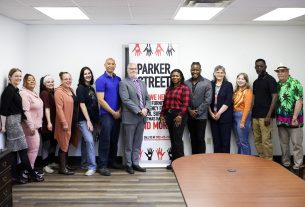**** NSHA Media Release
QEII Health Sciences Centre second hospital in Canada to receive orthopedic surgical robot
Entire project to be funded by QEII Foundation donors
Nova Scotia Health’s QEII Health Sciences Centre is now home to the Mako SmartRobotics system – the second surgical robot of its kind in Canada.
The innovative robotic arm is controlled by a surgeon during hip and knee surgeries and offers unprecedented precision for the placement of a joint implant (arthroplasty surgeries).
Nova Scotia Health is planning to deliver robot-assisted partial and total knee replacements later this fall at the QEII Health Sciences Centre. The $2.5-million project will be fully funded by QEII Foundation donors, with the QEII Foundation actively raising funds to support the robot and the affiliated research.
For Dr. Michael Dunbar, it is a personal career highlight. He is considered an international thought leader in his field, and is spearheading this work alongside Dr. Glen Richardson and Dr. Janie Wilson. The team is conducting critical research to validate the efficacy of robotics in hip and knee surgeries. The long-term goal is to broadly offer better, more personalized surgery for Nova Scotians and to lead innovations in robotic arthroplasty globally.
Nova Scotia Health’s Innovation team collaborated with the organization’s orthopedic surgeon leads and Stryker — an industry partner and one of the world’s leading medical technology companies — for more than a year to secure the Mako System.
The surgical team will be the first in Atlantic Canada to maximize the personalization of procedures based on patient factors and unique, individual anatomy. They will evaluate patient outcomes when compared to traditional surgery, and how the surgical robot could be used on other joints in the body as part of their research study. This cutting-edge technology will transform the future of arthroplasty in Nova Scotia for the benefit of patients.
QUICK FACTS:
- Mako SmartRobotics by Stryker is a system that combines CT-based 3D images with haptic technology to guide surgical cuts that are more precise than what the human hand can offer. Haptic technology acts as ‘guardrails’ during the procedure – the surgical cuts are pre-planned, and the system shuts off if the surgeon moves the robot beyond the planned cut.
- The robot is for surgeries of the hip and knees, which includes both partial and total knee replacements and hip replacements.
- The orthopedic robotics program will be implemented in a phased approach at Nova Scotia Health’s QEII Health Sciences Centre, beginning with knees this fall and expanding to offer robotics-assisted hip joint replacements.
- Hip and knee replacement surgeries are some of the most developed surgeries in the world. Traditional surgery continues to be an excellent option for patients. The robotic technology is simply evolving these surgeries to the next level of excellence.
- Nova Scotia Health’s QEII Health Sciences Centre has a rich history of research and driving innovations in orthopedics. Teams have studied how individuals move and feel before and after joint replacement surgery. This robot creates precise data at the time of surgery.
- Early research indicates the robot offers many benefits to patients including less pain, quicker recovery, shorter hospital stays and more natural feeling movement after surgery. It is also believed to reduce the likelihood of a second surgery and may allow more patients to avoid a more invasive total knee replacement if a partial knee replacement is possible. All of this must be proven definitively – the goal of the research program at Nova Scotia Health is to position the QEII Health Sciences Centre as a leader in this area and provide additional evidence for the research community.
- The QEII Health Sciences Centre became the first location in Atlantic Canada with a surgical robot in 2019 – when robotics technology transformed urological and gynecological cancer surgeries. The $8.1-million initiative was entirely funded by QEII Foundation donors and has since expanded to include ear, nose and throat (ENT) cancer surgeries.
- In 2020, Nova Scotia Health’s QEII Health Science Centre Division of Neurosurgery also became the first in Canada to use new robotic technology for brain surgery.
- This latest expansion of surgical robotics to now include orthopedic surgery will help further establish the QEII Health Science Centre’s reputation for innovation and excellence, establishing it as a Canadian leader in innovative surgical robotics, research and care.
- Nova Scotia Health’s innovation team, as part of the organization’s Health Innovation, Research, and Discovery Hub, is transforming health care delivery and improving the health of all Nova Scotians by leading initiatives that deliver high-impact health care solutions and developing strategic partnerships with clinical champions, industry, healthcare foundations, government and academic partners.
QUOTES:
“Nova Scotians deserve more timely access to the hip and knee surgeries that can dramatically improve their quality of life. Surgical robots are another medical advancement we can use to improve outcomes for patients.”
Minister Michelle Thompson
Nova Scotia Department of Health & Wellness
“We are proud of our community of donors who continue to support changes in how care is delivered at the QEII. Donors are hungry for opportunities to step outside the status quo and do better for Atlantic Canadians. We are confident that the orthopedic surgical robot will offer that opportunity.”
Susan Mullin
President and CEO, QEII Foundation
“Nova Scotia Health is now a leader in surgical robotics. Having this innovative technology – and this innovative surgical team – is key to our ability as a province to be a magnet that attracts and retains bright minds and top talent. Support from the QEII Foundation and its donors, along with our clinical, academic, research, innovation and business partners, is allowing us to spearhead world class innovation and research through the application of robotics technologies to optimize care and outcomes for patients and families.”
Dr. Gail Tomblin Murphy
Vice President, Research, Innovation and Discovery, and Chief Nurse Executive
Nova Scotia Health
“Having this piece of technology will revolutionize the way we provide orthopedic care for Nova Scotians. For the first time, using this surgical robot, we’re able to investigate and precisely replace a joint that is tailored to the patient, by being able to adapt the surgical plan based on their unique skeletal shape and soft tissue envelope. Paired with our research study, what we learn will benefit many people in the future.”
Dr. Michael Dunbar, MD, FRSCSC, PhD, FCAHS
QEII Foundation Endowed Chair Arthroplasty Outcomes
Orthopedic surgeon, QEII Health Sciences Centre, Nova Scotia Health
Professor of Surgery (Orthopedics), Dalhousie University
“We’ve developed an ecosystem that brings biomedical technology and clinical studies together to understand particular aspects of patient outcomes that aren’t possible without that technology. The robotic technology will now allow us to leverage the knowledge we’ve developed from years of research by allowing us to develop and validate precise surgical plans that are specific to the needs, the anatomy, and the function of the individual patient.”
Dr. Janie Wilson, PhD
Director, School of Biomedical Engineering, Dalhousie University
Affiliate Scientist, Nova Scotia Health
Tom Chergey
Vice President & General Manager, Stryker Mako
ADDITIONAL RESOURCES
- QE2Foundation.ca/orthorobot
- NSHealth.ca/robotics
- https://youtu.be/V_8OtQxIlj8




